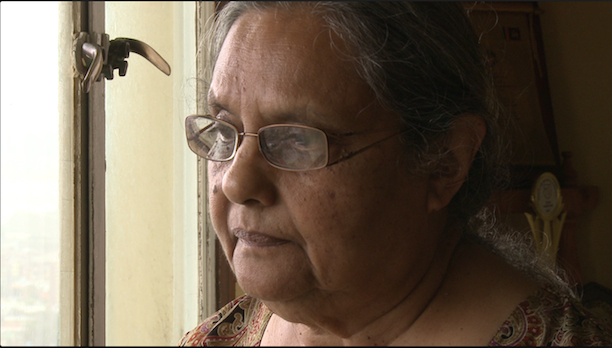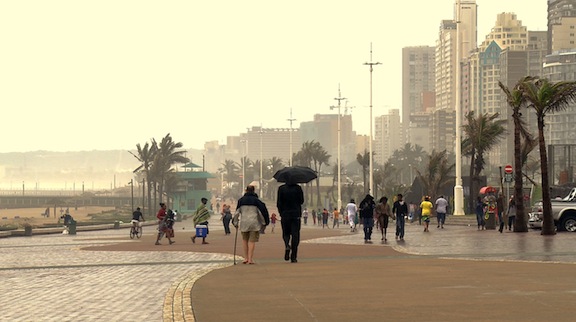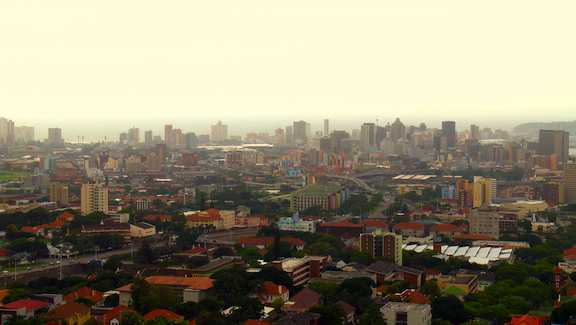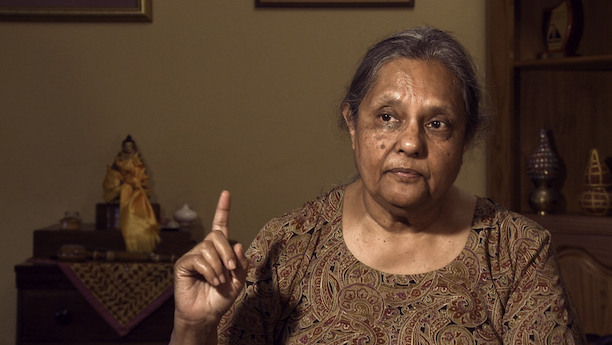Ela Gandhi is the granddaughter of Mohandas Gandhi, also known as 'Mahatma' (great soul) Gandhi, the man who famously led Indians to independence from their British colonizers in 1946. She was born in 1940 in the Phoenix Settlement in the Inanda district of KwaZulu Natal, South Africa. An anti-apartheid activist from an early age, she was banned from political activism in 1973 and placed under house arrest for a total of nine years. Gandhi was a member of the Transitional Executive Council and gained a seat as a member of the ANC in Parliament from 1994 to 2003, representing Phoenix which is in the Inanda district. Since leaving parliament, Gandhi has worked tirelessly to fight all forms of violence. She founded the Gandhi Development Trust which promotes non-violence, and was a founder member and chair of the Mahatma Gandhi Salt March Committee. In 2002, she received the Community of Christ International Peace Award and in 2007, in recognition of her work to promote Mahatma Gandhi's legacy in South Africa, she was awarded the prestigious Padma Bushan award by the Indian Government. I met her recently at her home situated in the middle-class suburb of Glenwood in Durban. We talked about her time as an activist during apartheid, the Middle East conflict and politics in South Africa today.

Ela Gandhi looking out the window in her home in Durban - Photography by Naashon Zalk
What was life like under apartheid?
There were many, many difficulties that we faced. In the area where I was born [...] we had no electricity, no running water. The roads were never fixed. Public transport was not available except for trains. So in terms of government services, we had nothing in that area. When I started school, I found [...] that there were no schools that accepted different race groups together. There was this strict policy that you can only run a school for one race. Growing up as a person who wasn't white, I saw that there were lots and lots of problems that we had to overcome. For instance, in Durban itself we couldn't go to the amusement park. The libraries were not accessible to us. The university was not accessible to us. We had to go to the non-European section of the University of Natal in order to get our education.
Do you remember when Bishop Tutu came to the beach in Durban to make a statement against segregation at the beach?
Yes, I do remember when he marched on the beach in Cape Town. We had our own march in Durban led by Archbishop Hurley and others from the inter faith community. I do not remember Archbishop Tutu joining us in Durban. That was in 1990. He said, 'all beaches for all God's people'. We too echoed these words out here. During apartheid we had a beach for white people, one for Indians, one for coloreds, and then one for Africans right at the back .
When you joined the ANC, how did you reconcile the armed struggle with your grandfather's passive resistance?
We always advocated non-violence right from the beginning. [...] But when a group of people after seeing the intransigence of the government felt that the best way was to use violent means, they weren't saying that they wanted to kill people. They weren't out there to say, "Now, it's either my life or it's your life." [...] It was about sabotage, it was about attacking installations, not people. My father participated in the non-violent struggle during 1952. He served many sentences in prison. Similarly, I also participated in non-violent struggles in Durban in particular. I was banned and house arrested for about nine years.
Was there any point when you felt that sabotage had failed strategically and that you would have to start targeting people?
No, at no stage did I feel that we could win our liberation by killing people. Yes, in my philosophy there was place for self defense, there was place for other methods of demonstrating against a wicked policy. Within our circles, there were discussions about whether people should engage in violent activities or not. We, many of my colleagues and I chose non-violent ways of confronting the state. So, yes, it was a conscious decision that we made to remain non-violent but this did not mean that we condemn those who choose other ways of confronting the evil system of apartheid which by its own nature was extremely violent. Gandhiji also did not condemn people like Shobas Chandra Bose and Jayprakash Narayan and others who were engaged in sabotage. My grandfather didn't criticize anyone. When General Jan Smuts - the person who put him in prison - didn't want to grant him the rights he was asking for, [...] my grandfather still respected him, and General Smuts had the greatest admiration for him. That can only happen when you respect each other even if you do not agree with each other. Nonviolence is based on this principle of love. When we realize that there is some humanity in every person, then we cannot kill the person. This is what Gandhi taught us. So we protested against apartheid because apartheid was a bad policy. It affected a lot of people in very negative ways so we opposed apartheid, not the people. You've got to separate the deeds from the people who commit them.
Did you ever find out that some people close to you were spying on you?
There were lots of unknown Special Branch people who used to keep an eye on us. They recruited people from the community, paid them and asked them to spy on people like us. So there was a culture of spying at that time. Even people who worked with us. They would come and visit us, pretend to be just as concerned about the situation as we were, but they were giving information to the government. There were times when we were preparing to have a demonstration or something and before we could even put posters on our cars or go out on the march, the police would come and either arrest all of us or confiscate all the posters. So it was obvious that somebody from within our group informed them that something is happening and that activists were planning something. Many people were able to earn their livelihood from such activities. But then they also had to live with their consciences.

View of Durban boardwalk taken from the OR Tambo Parade - Photography by Naashon Zalk

View from Glenwood over Durban City Centre - Photography by Naashon Zalk
Do you remember February 2 1990, the day of the famous speech F.W. de Klerk made about the unbanning of the ANC and the liberation of Mandela?
Yes, absolutely. We knew that it was coming and we were a bit skeptical as everybody else was as to how far he was going to go. We felt that it was maybe a ruse. So it was a surprise when he started the process towards releasing the political prisoners. We were all very keen to see the process unfold.
Do you remember the day of the liberation of Mandela?
Yes, I do. I was in Durban. I met him the day before as part of the UDF [United Democratic Front] delegation. We had already met Walter Sisulu and other people who had been released prior to him. We spoke about how we were going to take this forward. He wanted to hear what the people were saying and feeling at that time.
What do you think the Truth and Reconciliation Commission achieved?.
I speak as a person who was in Parliament and who made the law to put the Truth and Reconciliation Commission together. The Truth and Reconciliation Commission was not just about confessing, but it was also about being able to repent, about forgiveness and about knowing what happened. There were a number of groups in the commission, a group of people who would offer counseling services and healing, there was another group who would offer reparations, and another group who would investigate, and bring the matters to the Commission. I believe that to a large extent it did help many people in getting to know and confronting what happened. Because a lot of the facts during apartheid were suppressed because of the media blackout, because people were banned or they were in prison. A lot of the information was not known to the people and a lot of white people, who were prevented from knowing what was happening in the remote areas of the country or in townships, for the first time heard that these horrible things had taken place. And so in that respect, it played a very big role in conscientizing people of the horrors of apartheid. But, yes, there are people who still feel frustrated because there are some stories that still haven't come out. There are lots of people who feel that the reparations were not sufficient and so their lives didn't change. Also many of the perpetrators were able to continue with their lives and are far better off financially then the victims were. This was disturbing and people felt that apartheid had not been destroyed. They felt that now that we were liberated, things would be different overnight but did not realize that it doesn't happen that way. You can have a new government. But the government alone cannot change things.[...] It is traumatic to talk about the difficulties that we went through. But then we can't continue to live with the pain of the past. We have to learn from it and ensure that such things never happen again. But to have the continuous hunt for perpetrators such as in the Nuremberg trials, which are even continuing today and to live with the pain of the Holocaust experience which continues to affect people's minds until today, is not what we felt we should have in South Africa. Not that we forget about it but we learn to forgive and to heal. We have to close that chapter and look at the future, learning lessons from the past. That's my view.
I sense that some people are fed up with the current administration. What do you think about the current state of democracy in South Africa?
You see for me democracy is about working together. I believe in a participative democracy. When I was in Parliament we had a government of national unity. That is what Mr. Mandela had talked about and that is what we had when all parties came together to build our common country. But this partnership degenerated. Now the parties are there just to attack each other and today I can say that if another party comes to power, it's not going to be any better. They are all fighting for power but no one has a blue print to say how they intend to deliver to the 45 million people of this country. [...] So right now we stand at a crossroads where we don't have confidence in our parliamentarians. We really need people who are dedicated to serving the people and not to just be in power for selfish motivations. We also need constructive discussions and debates rather than constant nit picking and attacks on each other.

Ela Gandhi interviewed by Nicolas Rossier - Photography by Naashon Zalk
If your grandfather were alive today, how would he approach the situation in the Middle East?
Well, he would look for a nonviolent solution. He would make every effort to bring people together as close as he could, use every power that he has to bring them together to negotiate, to talk to them about how they can live together. If de Klerk and Mandela did not have confidence in each other, they wouldn't have done what they did. They had confidence in each other and that led to the discussions and the negotiation process. There were strong leaders on both sides. Mandela had the strong leadership he acquired from his experience in Robben Island and also from other ANC leaders in exile, and de Klerk had people like Roelf Meyer, Pik Botha and others. All these people were prepared to listen to each other and were prepared to realize that this is our country and we can't build it alone and that we needed each other. There was a realization among the leaders that there had to be a change and that to bring about that change, they had to sit together and talk and find common ground and that's what Israel and Palestine need to do.
It seems that one of the problems in the Middle East today is that there are no strong leaders with a vision like Rabin or Mandela or de Klerk or even people like your grandfather to lead the process forward.
There are a lot of people outside Israel who could put more pressure, pressure in the sense that "look, time is up now. You have to negotiate. You can't go on like this." Israelis are not living in peace. They're not happy. They are looking at their windows and doors all the time as to who's going to come in, where the bomb is going to be detonated next. So are the Palestinians and so they're not happy. They are not secure. How do you bring them together? The people on the ground want a settlement. They don't want to carry on the way they are carrying on but the fear in them has been fanned by the propaganda on each side where people are saying, "look, unless we get rid of these people they are going to continue to do this. We have to overpower them. We have to have more weapons, a bigger army." But when Israel is destroyed, Palestine will also suffer and when Palestine is destroyed, Israel will also suffer. So that is not the answer.
What could break this cycle of distrust and violence? What about a big peace march like your grandfather organized in India?
[....] The march that you talked about that was the Salt March*. It was against a tax on salt, a particular law that he fought against and that's why he marched and he made his own salt. It was a defiance of a law. Now in Israel, what is it that we want to defy or in Palestine? So you need to look at the situation in that area. You can't just say that a march or a peaceful demonstration will have the desired effect. Only when you look at it strategically, what are the issues faced by these people and what is it that is going to bring about the change, then you can have a peaceful demonstration that leads to concrete results.
Going back to South Africa, the overall impression I get from ANC members or sympathizers is that the white minority is still holding disproportionate power in the economy. You could make a case that the blacks have political power today but they still don't have economic power.
Eighty percent of the wealth of the country is in the hands of a minority of whites but it doesn't mean that every white person is well off. You have a lot of white poverty. You go on the road and you see white people begging side by side with African people and Indian people. So you have poverty in every race group and you have wealth in every race group. But there are certain white people, a small group of white people who are wealthier, who have control over the mining industry, over big industry and so on. They are the ones that tilt the scale and build the huge gap between the haves and the have nots. They control the wealth and economic power. It's a small group and similarly there are African people and Indian people who are also wealthy and who are also using their wealth to control, to get power, to actually further their own agenda. That is what causes the poverty on the other end. I believe that we can - with sufficient following - go and speak to these people and say to them, "look, what you're doing is wrong. Give something back to the people of this country. Let's begin to see how you can together use your wealth, use your economic power in order to lay the foundations for a better society in this country." You can do lots of things with that wealth. You can build housing for the poor. You can make medical facilities better than they are at present etc. This is the idea of trusteeship that Gandhi spoke about [...] We have many leaders in civil society who can play a major role in bringing the races together, bringing the communities together, bringing the rich and the poor together, trying to create a society where there's more equity - and all that can happen outside government. Government will become irrelevant if it doesn't work with civil society. If the community becomes strong and has these kinds of values, then it's not going to be dependent. It's going to find its own leaders and it's going to put its own leadership into the government eventually. Right now we are still dealing with issues of race and ethnicity and that's a major part of the problem we have now. It's about political parties which are based on race and ethnicity, whether it's the IFP, DA or Minority Front or Freedom Front and in as much as they deny it, these parties are based on ethnic identities.
Thank you so much for your time.
You're welcome.
Footnote:
* The Salt March also known as "the Dandi March" or " the Salt Satyagraha", began with the Dandi March on March 12, 1930, and was an important part of the Indian independence movement. It was a direct action campaign of tax resistance and nonviolent protest against the British salt monopoly in colonial India, and triggered the wider Civil Disobedience Movement. After making salt at Dandi, Gandhi continued southward along the coast, producing salt and addressing meetings on the way. Gandhi was ultimately arrested on the midnight of May 4, 1930. The satyagraha against the salt tax continued for almost a year, ending with Gandhi's release from jail and negotiations with British authorities. Over 80,000 Indians were jailed as a result of the Salt March.
This is an excerpt taken from a taped interview conducted by filmmaker Nicolas Rossier for a documentary called "the Other Man" about the legacy of Nobel Laureate F.W. de Klerk to be released in January 2014.
Text and Photos are the (C) of Baraka Productions LLC - www.barakaproductions.com

